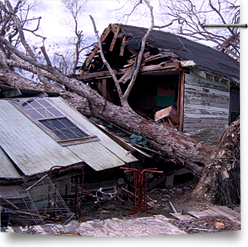Staying With Animals Deadly For Some
4/30/06 SunHerald.com, By Karen Nelson ~ Roselyn Desrochers was swept away while hoisting her Chihuahuas to safety in the Hurricane Katrina storm surge that obliterated Waveland. Searchers found her body two months later, three miles from where she'd lived in a doublewide mobile home one block from the beach. The dogs died with her. She was 57. "That's the only reason she stayed," said her daughter, Josie Brown, who lives in Louisiana. "She said there was no place to take them."Animal advocates, lawmakers and civil defense leaders now recognize animals matter in evacuations. Some New Orleans residents would not leave flooded homes without pets. Areas in Florida include animals in emergency plans. In the wake of Katrina, Harrison County's first pet-friendly shelter will open for 2006 hurricanes. But for most of the Coast, the issue is unresolved. Red Cross shelters ban pets, citing safety/hygiene concerns.
In Jackson County, Civil Defense Director Butch Loper said, "I don't have enough shelter for people in trailers. You think I'm going to worry about a dog or a cat?" But Tara High, Humane Society of South Mississippi director, said, "Hurricane Katrina made it crystal clear that the human-animal bond is strong. People died."
The relatives of seven who died in Katrina told the Sun Herald their loved ones stayed for beloved pets. Of the seven, four were 60 or younger. One was 81, one was 75 and one was 66. And there are many people who almost died. Veterinarians along the Coast have story after story of clients with harrowing experiences. Ava and Ed Carson have a home and three cats in the Pinehurst subdivision of south Jackson County. Many of their neighbors stayed because they didn't expect high water in their area. But Katrina's surge would flood the Carson home. Ava, unable to swim and limited by two neck surgeries, fought to keep her cats dry in pet crates atop a floating loveseat while her husband beat a hole in the ceiling so they could climb into the attic.
Struggling, they dropped the crate with the youngest cat. "There was four feet of water under my shoulders and I couldn't lift her," Ava Carson said. "He got the other two onto the attic edge. He came down the ladder and pulled the pet taxi out of the water and got his unconscious cat out. "She was gone. Her eyes were rolled back." But the cat lived. Ed Carson used CPR and very mild mouth-to-mouth resuscitation on Moxie Muffin, the 2-year-old stray they'd adopted.
Compassion along the road. As people moved north from Katrina's predicted landfall, some sheltered pets in cars and some found help at businesses along the way. Dr. Chris Duke with Bienville Animal Medical Center in Ocean Springs said kennels and vets opened their businesses to displaced pets all the way to northern parts of Mississippi and Alabama. "When all was said and done, there was a lot of compassion from people up and down the roads," Duke said.
Coast veterinarians learned the risk of sheltering animals on. Many feel leaving animals south of Interstate 10 is not a good option. Inundated clinics and kennels lost Katrina animals. People who boarded animals at vet clinics or elsewhere, such as the Keesler Air Force Base gym that housed 150 pets for employees and families, dealt with large numbers of animals situated in one area without water or electricity for days or weeks.
Leaving them home proved tragic for many. Gautier Fire Chief Mike Gray crated his 3-year old Lab mix Gracie and covered her with a blanket because she feared storms. "I was home until well after dark Sunday night. She was with me," he said. "Before I left, I made sure her kennel was cozy and she wouldn't be scared. I left her happy. When I opened the door, she went right in."
He pushed her into her usual place under the breakfast counter, packed a sleeping bag and headed for Central Fire Station to ride out the storm. By midday Monday of Katrina, he knew his house was flooded and his dog was lost. "We couldn't get very far from Central Station. In every direction, there was water. That's when we realized."
South of the railroad tracks there were whitecaps in the residential areas. Later, wading "I had to climb over things to get in like washing machines," Gray said. "Stuff was in a big jumble." And Gracie? His worst fears were realized. "She was washed up in her kennel," he said. "Twenty feet from where I left her."
The times are changing. It used to be [guardians] were advised to leave pets at home with food and water to last three days, Tara High explained. "Now the advice is 'If it's not safe for you, it's not safe for your pet.' Take them with you."
But that brings up the question of how. Not all 14 pet-friendly Jackson hotels on pettravel.com actually accept pets. Of 8 shown, one had only 15 rooms for pets, two don't allow them and four require a pet fee ranging from $10 to $75.
Of 12 hotels that the Hattiesburg Chamber of Commerce lists, only two take pets with no restrictions. One only allows pets under 30 pounds, one charges a $25 pet fee and one might make an exception in emergencies. Seven do not accept pets altogether.
What is Louisiana doing? A LA Senate panel agreed that creating a plan to rescue pets would also prevent loss of human life, but has not decided how to fund such an effort. Lawmakers are considering:
*Issue ID tags for pets in case they are separated from [guardians] during evacuation. Cost estimate: $2 million to tag animals and run a database.
*Require blind people be allowed to evacuate with their seeing-eye dogs.
*Require the state to identify suitable animal shelters near evacuee shelters.
*Use state transportation dept. in part to transport animals to shelters.
Pet-friendly. Humane Society of South Mississippi, Harrison County schools and civil defense have united to create a pet-friendly evacuation shelter for the coming hurricane season. Still, officials advise people to use the shelter as a last resort. If you have the means to shelter with animals elsewhere, do that.
Where: Near the masonry shop on Harrison Central High School grounds.
Provided: Organizers hope to supply 200 crates for animals.
Requirements: Stay with pets, supply food, transport, gear, vaccine proof.
Suggestions: Bring your own crate. Bring snacks and bedding for yourself.
Restrictions: No reptiles, aggressive animals or those who top 80 pounds.
Workshop/Retreat for Katrina Animal Rescuers
When: Sunday, June 4, 2006Where: Potomac, MD
Registration: kinshipretreat.org
Dr. Pia Salk ~ Focus: The grief and rage still felt, reintegration to the world around us, ways to cope, ways to garner support, what to do now, how to get help, how to remain effective and so forth.
The purpose is multi-fold:
- A safe forum to express feelings
- A sense of closure
- Re-establish ties to each another and those who support us
- Re-energize for the work that is ahead and so important to all of us
- Create a memorial for the animals
Spouses and partners are welcome. Some focus will be given to how they can offer support and how rescuers can integrate that support.
This is not therapy. While some exercises are therapeutic, they are not meant to replace actual therapy or the services of a mental health professional.
Pia Salk is a clinical psychologist who co-founded Animal Rescue New Orleans with Jane Garrison and David Meyer.
Help Hammond Animals Get To No-Kill Shelters
Tangipahoa Parish Animal Control15487 Club Deluxe Rd / Hammond, LA 70403
985-543-0215, tpac@tangipahoa.org
after hours: 985-429-1877, Betz Pittman
View Animals: Tangipahoa Animal Shelter
Melinda Plasse, 518-527-2772 ~ When my associates and I visited this shelter on 5/1/06, there were about 70 new puppy arrivals that day. Each day they get similar numbers at their doorstep. We must transport these animals to no-kill locations elsewhere in the country. Tangipahoa's population has risen 40% from an influx of former 9th Ward and New Orleans East residents. Their pets now run free, or were surrendered due to no-pets landlords. I estimate the shelter's annual intake has doubled to 5,000 animals.
Hammond Shelter Needs
- Portable kennels for outdoor set-up.
- Money for meds. Shell gas cards for transports.
- People to adopt and foster.
- VISA/Mastercard donations to Lucy Pribbenow's account at Hutchinson Animal Clinic to sponsor health care that enables animals to leave the state.
- Petco and Petsmart gift cards for shipping crates.
Email Melinda Plasse. In Email State:
- From your animal's ID photo: number, time/date, caption, description.
- Criterion that would prompt you to not take animal.
- Imperative, or we can't reply to foster/adopt request:
full name, street address, state, zip code
phone numbers / email address - I agree to surrender this animal to Melinda Plasse if I can't keep the animal.
- Contact: [another] Melinda at Hutchinson Animal Clinic in Tangipahoa Parish: 985-748-9160. Your call is to donate $40 (per animal) for heartworm test, rabies vac, health certificate required to cross state lines.


Gulf Animal Bills
Louisiana Pet Evacuation Bill4/28/06, Public Support Pushes Along Bill, But More Help Needed, By Claire Davis ~ Thanks to unprecedented grassroots support, Louisiana's Pet Evacuation Bill sped through the Senate Judiciary Committee. But legislators face funding challenges, with a Senate Finance Committee hearing scheduled.
"This is one time in my life I've seen a grassroots campaign really work," says Cathy Wells, who researched and drafted the bill for the Senate Committee on Environmental Quality. "If it had not been for the bombardment of letters, emails, faxes and phone calls, we would not be where we are today."
Ask LA To Pass Pet Evacuation Bill
Jerry Luke LeBlanc, Admin Commissioner
P.O. Box 94004 / Baton Rouge, LA 70804
225-342-7000 or 800-354-9548
fax: 225-342-5653, doacommissioner@la.gov
Governor Kathleen Blanco
Attn: Constituent Services
P.O. Box 94004
Baton Rouge, LA 70804-9004
866-366-1121, 225-342-0991, 225-342-7015
fax: 225-342-7099, contact@la.gov
Louisiana: Cockfight Ban Fails
4/28/06, Pet-Abuse.com ~ A bid to ban cockfighting failed in the LA House after a debate that focused more on legislative process than the actual issue. Rep. Cedric Richmond, D-New Orleans, tried to add the ban to a bill that expands state protected birds to cover swans, geese, ducks, ostriches and peacocks. The amendment failed, with 41 votes in favor, 49 against. Louisiana is one of the last states to allow cockfighting, which pits birds with razor-like devices, in bloody combat. Backers call it an entertaining sport. Richmond and other critics contend it should be illegal. "Let's finally do away with this barbaric way we treat animals in Louisiana," he said.
Mississippi: Cats Protected
4/28/06, Pet-Abuse.com ~ Cats are now legally protected in the state of Mississippi. Gov. Haley Barbour signed a Senate bill into law, outlining punishments for any person who maliciously kills, maims or wounds a cat. The law includes the same penalties for injuring a dog, but dogs were covered in previous laws. It's the dog "or cat," underlined throughout the bill, that Natchez resident Annette Byrne and Sen. Bob Dearing have awaited. Three years ago Byrne learned about a Natchez man who allegedly threw his neighbor's cat into boiling oil. The man was arrested and ultimately released without punishment by a judge who cited no state law against harming cats. Byrne contacted Dearing, D-Natchez, and asked him what could be done.
Louisiana: Internet Hunting Ban
Internet or remote controlled hunting subjects animals to undue suffering by removing the shooter from the scene of the kill, where he or she could ensure a swift and humane death, and has the potential for subverting state laws and regulations that govern a hunter's age, training, and licensing requirements. Urge LA House Natural Resources Committee members to support HB49, HB52, and HB1059.
Small Bites
News named Small Bites as a reminder to donate small-bite food (or cat food).Pit Bull Rescue Resources
- American Pitbull Terrier Rescue
- Second Chance At Love Humane Society
- Villa Lobos Rescue Center
661-268-0555
In Canyon County
45 min N of Los Angeles - Pit Bull Rescue Central
- Animal House Animal Rescue
13005 Ernesti Road
Huntley, IL 60142
847-977-2066 or 847-961-5541
info@animalhouseshelter.com
FEMA Independent Study
FEMA Certs Required By DARTs
FEMA Independent Study (ISP):
IS 100
IS 200
NIMS 700
NIMS 800
See Kinship Circle Disaster Animal Response Training Resources
*Kinship Circle does not use the language of slavery to depict nonhuman animals. Owner, owned, it… are replaced with guardian, him/her, caregiven… or other words that don't define animals as things and property. Failure to modify text is unintended.



